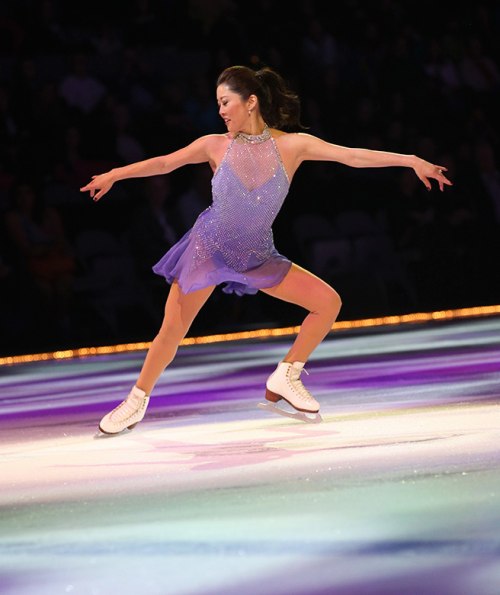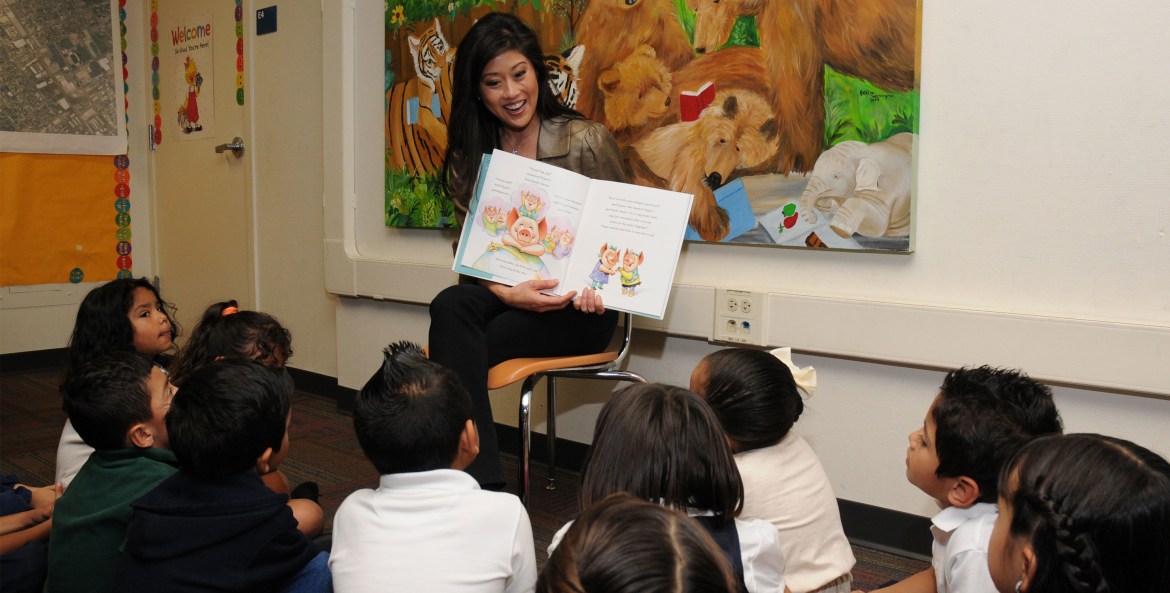After taking gold at the 1992 Olympics, AAA Member Kristi Yamaguchi toured with Stars on Ice, had two daughters with husband and NHL star Bret Hedican, won Dancing with the Stars, and became a best-selling children’s author. Her Always Dream Foundation ensures low-income families have access to high-quality books at home to help foster a love of reading.
Q. You attempted other sports before skating. Was that important?
A. I tried soccer, gymnastics, and baton twirling. They became a chore—even gave me anxiety stomachaches. I’m thankful that I tried. Otherwise, I wouldn’t have known that skating was different.
Q. Got any tips for children in sports?
A. What I’ve seen is that talent can only take you so far. My parents knew skating had to be my thing. If I put in 110 percent, they’d support it. If not, then it was too great an investment of time and money.
Q. How did you find your next passion?
A. At Stars on Ice, I worked with beneficiaries from Make-a-Wish. Seeing the impact opened my eyes to making a difference. My foundation, Always Dream, supports early childhood literacy, which sets up kids for success in school and life.
Q. You've written three children's books. How do you choose the themes?
A. My first book, Dream Big, Little Pig!, is about perseverance. It’s not an autobiography, but it’s based on me trying different things and finding my path.
Q. Why a pig as the main character?
A. I was born in the Year of the Pig, and my parents called me Pigpen because I played in the sandbox so much. For the book, it was perfect: Who would expect a pig to be able to skate?
Q. What role did your parents play in helping you become a champion?
A. My parents were definitely instrumental in my success. They were so supportive early on, and throughout my career. They didn’t know what they were getting into, which was probably a good thing. But they saw how much I loved skating and how it really brought out a different side of me. I was a very shy and timid child, but I kept asking to go back to the rink over and over again. They were like, “OK, yay, she found something she likes.” And then skating gave me confidence and helped me express myself more. It was a huge commitment for them—the whole family, really. By junior high, I had a special school schedule.
Q. What do you mean by, “They didn’t know what they were getting into”?
A. My mom got up at 4 a.m., six days a week, to get me to the rink, so that I could be on the ice from 5 a.m. to 10 a.m. She traveled with me at least once or twice a month to competitions. And then financially, too: It’s probably one of the most expensive sports out there. So yeah, I think they just didn’t know what kind of commitment it would be.
Q. Well, it sure paid off.
A. But there was no guarantee of a payoff. No guarantee of any success. Because ice is slippery, right? You might be great in one competition, and in the next one you go, “Oh, what happened?
Q. Are your daughters into skating, too?
A. The younger one, Emma, is. She’s been skating eight years now, and I’m really proud of what she’s accomplished so far. She also does club soccer, and she’s very musical. I want my daughters to find their own thing, whether it’s skating, or something else.
Our older daughter, Keara, is a hula dancer. She performs and competes, and has been doing that for about 10 years now. She loves it. The girls she dances with are all her hula sisters. So that’s her passion.
Q. What has being a mother meant to you?
A. It’s the greatest thing in the world. If anything can trump winning an Olympic gold medal, it’s being a mom. I feel fortunate to have accomplished what I have, but—it’s so cliché—all I want now is to focus on my kids. You just want them to be happy.

Yamaguchi performing at her charity’s fundraiser.
Q. What does your Japanese heritage mean to you?
A. I’m a fourth-generation Japanese American. Growing up here in Northern California, where it’s very diverse, I never really thought too much about it. I had friends of all different backgrounds. My parents tried to instill some customs—like Girls Day and Boys Day and other traditions—but for the most part, we were very Americanized. We [knew] what the Japanese Americans went through during World War II—my mom was born in [an internment] camp, and my dad was in one when he was five—but this was hardly talked about when we were growing up. It wasn’t until we started asking questions. My parents just wanted to move on and be American. Our generation now is trying to get the stories told, because there aren’t that many survivors left.
Q. What’s the backstory behind your “Always dream” motto?
A. That goes way back. When Brian Boitano won his gold medal in the 1988 Olympics, he was an idol of mine, and a mentor. He signed a poster for me with a really nice message: “Keep dreaming.” I thought I needed a tagline, and I liked Brian’s message to reach for your dreams. After my Olympics, I started autographing things, “Always dream, Kristi Yamaguchi.”
Q. What advice do you have for others who dream of becoming champions?
A. Have a long-term goal in mind. My coach was really good at teaching us how to set short-term goals, too. She’d say, “Every day when you step on the ice, you’ve got to have a goal in mind.” Have a goal every day. And then have a goal for the week. And every competition, you’re reaching for a goal as well. And then all of those little goals take you to your next one. So you’re not always looking way out, thinking, “Oh my gosh, I can’t get there.” You’re getting some rewards, some satisfaction, along the way.
Q. What’s your advice for others who want to get involved in community work?
A. Think of what you’re passionate about. Literacy, obviously, is a passion of mine: My husband and I loved reading to our kids, I’m a children’s book author, and I visited a lot of schools because of that. Find out what it is for you, whether it’s feeding the hungry or providing clothes or whatever. Find an organization in your area and volunteer. Get to know the organization, how it works, and go from there.
Q. Tell us more about your Always Dream Foundation. Why early childhood literacy as your cause?
A. Right after the Olympics, I wanted to do something to give back. So the foundation was born, and we did a variety of things the first 15 years. Over the last seven years, though, we’ve been focusing on early childhood literacy. It became a big passion of mine. I had just written my first children’s picture book, and my kids were at that learn-to-read age. We saw how reading sets kids up for success in life. We didn’t want to try to fix problems once they’re in middle school, in high school. We wanted to get in at the ground level, to even the playing field and help create a foundation for a child’s success.
Q. Celebrities are the target of negativity sometimes, especially over social media. How do you deal with this?
A. It’s a whole other world now. I’m really thankful that we didn’t have social media back in the ’90s. But it has become a marketing tool for athletes and personalities, so it’s a necessary evil. The access [people have to you] is hard. Even just one negative comment can be hurtful. It’s hard for an adult to handle, let alone teenagers who are pursuing their dreams and are more emotionally fragile. One thing I’ve told [mentee] Karen Chen and other young skaters is, “I know you have to post. It’s great for people to see what you’re doing—but post and then don’t go back and look at the comments. You don’t need that going into a competition. You don’t want that in your head.”
Q. You lived on the road for Stars on Ice. Do you still travel a lot?
A. I do. A lot less than I used to. But still more than average.
Q. What’s your best travel tip?
A. Check, then double check, your flight information. Just double check. Because I’ve gone to the wrong airport before. I’ve landed at LaGuardia when I assumed I was flying into Newark.
Also, enroll in TSA Precheck. It’s better not to have to take your shoes off and unpack your bag. It’s, what, $85 for five years? If you travel more than twice a year, the stress it saves is worth it.
Q. What do you like about AAA Membership?
A. I’ve been a Member for something like 28 years, though I am kind of bummed because I lapsed on a payment last year and now my card says I’ve only been a Member for one year! I appreciate the roadside service for sure—there’s always peace of mind with AAA, plus great benefits and discounts.
